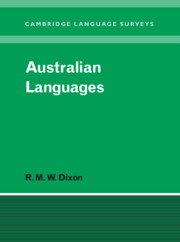Book contents
- Frontmatter
- Contents
- List of maps
- List of abbreviations and conventions
- Preface
- Acknowledgements
- Conventions followed
- List of languages and language groups
- 1 The language situation in Australia
- 2 Modelling the language situation
- 3 Overview
- 4 Vocabulary
- 5 Case and other nominal suffixes
- 6 Verbs
- 7 Pronouns
- 8 Bound pronouns
- 9 Prefixing and fusion
- 10 Generic nouns, classifiers, genders and noun classes
- 11 Ergative/accusative morphological and syntactic profiles
- 12 Phonology
- 13 Genetic subgroups and small linguistic areas
- 14 Summary and conclusion
- References
- Index of languages, dialects and language groups
- Subject index
4 - Vocabulary
Published online by Cambridge University Press: 22 September 2009
- Frontmatter
- Contents
- List of maps
- List of abbreviations and conventions
- Preface
- Acknowledgements
- Conventions followed
- List of languages and language groups
- 1 The language situation in Australia
- 2 Modelling the language situation
- 3 Overview
- 4 Vocabulary
- 5 Case and other nominal suffixes
- 6 Verbs
- 7 Pronouns
- 8 Bound pronouns
- 9 Prefixing and fusion
- 10 Generic nouns, classifiers, genders and noun classes
- 11 Ergative/accusative morphological and syntactic profiles
- 12 Phonology
- 13 Genetic subgroups and small linguistic areas
- 14 Summary and conclusion
- References
- Index of languages, dialects and language groups
- Subject index
Summary
Study of the forms and meanings associated with the open word classes (nouns, adjectives, verbs) in Australian languages is a vast topic in need of detailed study. A full treatment would require several volumes. Here I simply outline some of the main points, some of the problems and some of the tentative results to date.
First, a caveat is in order. There is a fine line between the recognition of a genuine meaning–form correspondence and fanciful hypotheses about relationships between words whose forms and meanings show a coincidental similarity. Consider three examples from English, of a single form with two meanings: fast, which can mean ‘quick’ or ‘firm, secure’ (as in stuck fast); ear which can be ‘organ of hearing’ or ‘part of a cereal plant’ (e.g. ear of corn); and bank which can be ‘raised shelf of ground’ (e.g. river bank) or ‘institution to do with money’. Some native speakers think that in all three cases the two meanings of the form must be related while others consider that in all three cases they are unrelated.
In fact the two senses of fast have developed from an Old English adjective fæst ‘firm’ (see Stern 1931: 216 for an account of the semantic shifts involved). But for ear and bank there is no historical relationship. The first sense of bank (as in river bank) is a Germanic form, while the second is a loan from Middle French banque.
- Type
- Chapter
- Information
- Australian LanguagesTheir Nature and Development, pp. 96 - 130Publisher: Cambridge University PressPrint publication year: 2002

